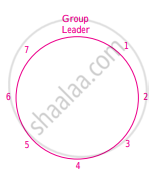Advertisements
Advertisements
प्रश्न
Correct the following sentence using facts from the passage.
Troy traded in cattle and grass, with other cities.
उत्तर
Troy traded in goods and grain with other cities.
संबंधित प्रश्न
Form groups of eight. The group leader prepares slips of paper for each of the seven points given below and distributes them among the others. The group sits in a circle, taking their seats according to the number on the slip they have. Then each one completes the sentence on his/her slip without sharing it with the others. The group leader collects the slips and reads all the sentences aloud as one continuous passage. Does the story make sense? The group then works on the story to make it more meaningful and interesting.
- Once there was a ______________.
- Who lived in a ______________.
- He/She ate _________________.
- She/He went _________________.
- There she/he saw _________________.
- She/He was _________________.
- That is why _________________.

This game may be played again, changing the groups, to form new stories.
How?: Follow the above procedure. Now all questions should begin with ‘How-?’
Correct the following sentence using facts from the passage.
During the war, Trojans jumped over the fort gates to fight the enemy.
Correct the following sentence using facts from the passage.
Helen eloped with Menelaus.
Correct the following sentence using facts from the passage.
Troy was attacked because it was a strong, rich city
Correct the following sentence using facts from the passage.
The Greek armies and heroes always defeated the Trojans.
State the counter-action for the following actions.
| Action | Counter-action | ||
| (a) | Helen eloped with Paris. | (1) | ____________ |
| (b) | The Greeks sailed to Troy and attacked it. | (2) | ____________ |
| (c) | Hector was killed by Achilles. | (3) | ____________ |
| (d) | The siege continued for ten long years. | (4) | ____________ |
| (e) | The fighting went on daily | (5) | ____________ |
Note the following construction carefully and then use them to express your ideas:
The Greeks were tired of the long war.
______ tired of ______.
Note the following construction carefully and then use them to express your ideas:
They are afraid of the long voyage home, too.
______ afraid of______ .
Note the following construction carefully and then use them to express your ideas:
They were so excited that they paid no attention to his words.
______ so ______ that ______.
Put the following events in the order in which they took place. Number them accordingly.
| (a) | The Trojans found a Greek man under the big wooden horse. |
| (b) | They broke down part of the wall and brought the horse in. |
| (c) | The cunning Odysseus thought of a plan. |
| (d) | The Greeks burnt their tents and sailed away. |
| (e) | Troy was burnt down. |
| (f) | The Greeks built a big wooden horse. |
| (g) | The great heroes hid inside the horse. |
| (h) | The priest warned the Trojans not to break the wall. |
| (i) | The Trojans were happy to see the Greek ships go. |
| (j) | The Trojans slept soundly. |
| (k) | The Greeks came out of the horse and opened the gates. |
| (l) | The Greek army entered the city. |
Form pairs. Imagine you are a pair of Trojans and you have come to know about Odysseus’s plan. Make a counter plan to defeat the Greeks. Write down your plan as you would explain it to your fellow Trojans.
Who is your favourite mythological character?
What do you like about that character?
If you could visit a place in the ancient world or the mythological world, which place would you choose? Which event would you like to see?
What was the cause of the ten-year-old war between the Greeks and Trojans?
Read the story and ‘retell’ it in your mother tongue. When you ‘retell’ a story, you tell it using your style and not translate it word by word. (Part I)
Underline the subject in the following sentence:
Paris had brought her to Troy.
Underline the subject in the following sentence:
The Trojans, too, fought hard.
Underline the subject in the following sentence:
The fighting went on.
How did Odysseus plan to defeat the Trojans?
What was the reason for Troy to rejoice and celebrate?
Was the big wooden horse really an offering to the god of the sea?
How did the cunning Greek explain the presence of such a large wooden horse?
How did the Greek ships remain hidden from Troy?
What did the Greek soldiers hidden in the wooden horse do after nighfall?
What distressing sounds and sights could be witnessed at Troy, that fateful night?
Refer to the Language Study pages and read the following entries:
- word
- phrase
- clause
- sentence.
Identify one example of a main clause and one example of a dependent clause from page 74.
